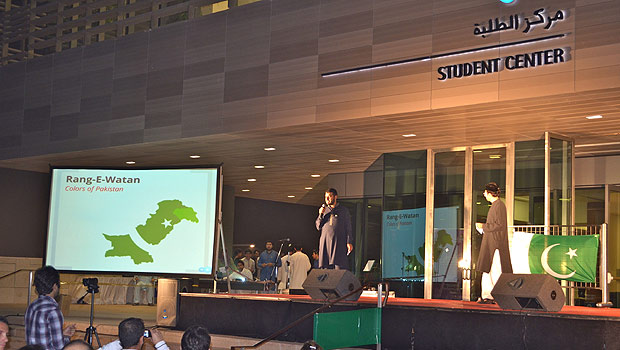Around 250-300 Pakistani and foreign students, faculty members and their families attended the event. The Student Center was decorated with Pakistani flag and posters showing historical places of Pakistan. Most of the Pakistani participants were dressed in traditional costumes.
The program started with recitation of verses from the Holy Qur’an followed by a documentary on Pakistan’s historical and touristic sites.
The students delivered speeches to highlight the importance of the day in the history of Pakistan. Youth from local Pakistani community presented national songs. Pakistani musicians entertained the audience with beautiful national and folk songs of all regions and languages of Pakistan.
Costumes of various Pakistani cultures, traditional khussas (shoes), handicrafts, bangles and calligraphy were displayed at the event, which were praised by the local and foreign participants.
The culture and folk music of Balochistan was highlighted by two Baloch folk singers Lal Khan Rind and Allah Bachayo, who performed with dhol and harmonium during the function.
Ancient archaeological sites Harappa and Mohenjo-daro were shown through posters, antiques and handicrafts resembling that era.
Harappa is an archaeological site in Pakistan's Punjab province near the city of Sahiwal. The present-day Harappa on the banks of the Ravi River is situated 6 km from the historical site. Although modern Harappa has a train station left from the British times, it is today just a small crossroads town with a population of 15,000.
Mohenjo-daro is located in the Larkana district of Sindh, Pakistan, in the middle of the flood plain of the Indus River Valley, 28 km from the town of Larkana. The ridge was prominent during the time of the Indus Valley Civilization, allowing the city to stand above the surrounding plain, but the flooding of the river has since buried most of the ridge in deposited silt. The site occupies a central position between the Indus River and the Ghaggar-Hakra River. The Indus still flows to the east of the site, but the riverbed of the Ghaggar-Hakra on the western side is now dry. Mohenjo-daro was designated a UNESCO World Heritage Site in 1980.
Pakistani handicrafts such as marble glasses, models of decorated trucks, buses and rickshaws were also a subject of interest to the audience. Ladies took special interest in embroidered shirts and cushion covers, bangles, imitation jewelry, ladies khussas (shoes) and henna.










